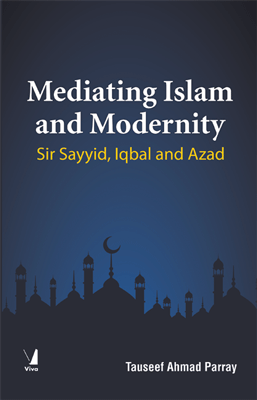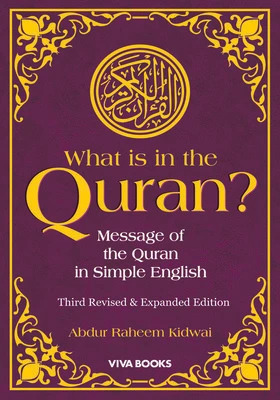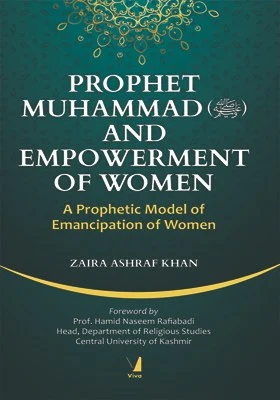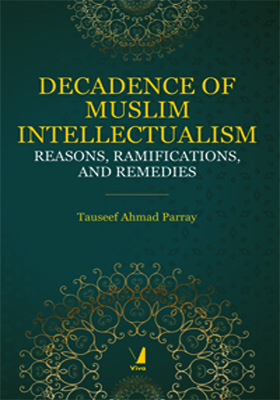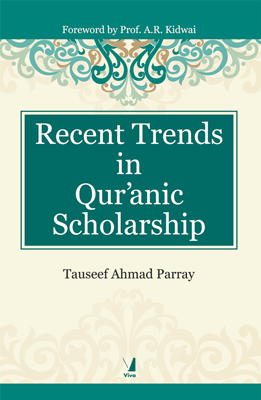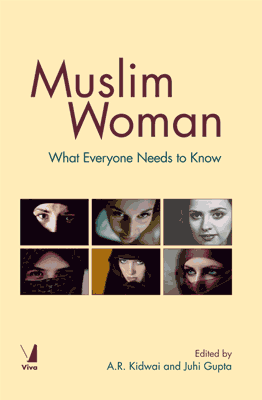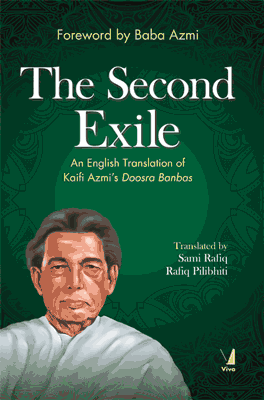Mediating Islam and Modernity
Mediating Islam and Modernity
Sir Sayyid, Iqbal and Azad
₹715.50 ₹795.00 Save: ₹79.50 (10%)
Go to cartISBN: 9789388653534
Bind: Hardbound
Year: 2019
Pages: 184
Size: 6 x 9 Inch
Publisher: Viva Books Originals
Sales Territory: Worldwide
"Mediating Islam and Modernity is a bold attempt and timely initiative that duly benefits from a wide variety of Urdu and English source-material, diverse interpretations and pertinent conceptual frameworks on Islamic revivalism, modernism and reformism, and is clearly aimed at both the graduate students and subject specialists. Considering Islamic Modernism steeped in enduring Islamic teaching and traditions along with a steady and confident understanding as well as adoption of European modernity, Tauseef Ahmad reflects on the contributions of Sir Sayyid Ahmed Khan, Allama Muhammad Iqbal and Maulana Azad—the three doyens of this innovative and permeating strand in South Asia. Without falling prey to defensive introversion or uncritiqued adulation, these and other Muslims modernists kindled a mediatory way for Muslims which remains as relevant today as it was a few generations ago. By using print media, public fora including politics, poetry and philosophy, these modernists mutually agreed on needed prerogatives such as ijtiha'ad, ijma'a, democracy and an energized educational system which, to them, could help Muslims attain sublime ideals of mundane and sacred varieties. Amidst the ongoing rush of books on exclusive forms of political Islam, this effort in the realm of intellectual history will help inculcate a more balanced view of Indian Islam in its recent career".
— Iftikhar H. Malik (Professor of History, Bath Spa University, England)
"A lucid and detailed study of three of the most celebrated Muslim intellectuals of modern India, this book casts a new light on their engagement with the idea of modernity".
—Faisal Devji (Professor of Indian History, University of Oxford)
"Dr Tauseef Ahmad Parray's Mediating Islam and Modernity: Sir Sayyid, Iqbal and Azad is an important contribution ... [which] skilfully analyses the[ir] thoughts ... beyond the narrow grooves of nationalism and its attendant doxa ... and the ways in which they relate to and differ from one another. The comparative thrust enhances the value of his text because most scholars have written about them separately. ... [I]n addition to using sources in both English and Urdu, Mediating Islam and Modernity draws on diverse disciplinary literature ranging from anthropology, Islamic studies, political science, religion and other disciplines. References cited in the text bear testimony to the author's expansive recourse to literature beyond history".
—Irfan Ahmad (Senior Research Fellow, Max Planck Institute, Germany)
Description:
An effort in mediating Islam and modernity, and reconciling traditionalism with modernism, this book—building on, and blending, the scholarship of past and present—brings together some major themes and issues of diverse nature (from educational and religious to political and contemporary issues) as propounded and promoted by Sir Sayyid Ahmad Khan, Muhammad Iqbal, and Abul Kalam Azad—the three pioneering and prominent South Asian modernist/reformist thinkers—within the broader context, and reveals their contemporary relevance. It analyses and examines their thoughts and visions on some important, contemporary and crucial issues like Islam-democracy discourse, Ijma and Ijtihad as dynamic legal tools and their relevance, "integration" (and adoption of some Western values, like educational system) as one of the Muslim responses to "Imperialism", and other interrelated issues. It will, thus, prove useful and helpful to the students in the field of South Asian History and Islamic Studies and general readers as well.
Target Audience:
Useful for the students in the field of South Asian History and Islamic Studies and general readers as well.
Contents:
Foreword: On Writing History
Acknowledgements
Preface - The Present Work: Contents, Context and Contribution
Chapter 1: INTRODUCTION: British Colonialism and ‘Pioneering Modernists’ of Colonial India on Reconciling ‘Islam and Modernity’ • Emergence of Islamic Modernist/Reformist Discourse During the European Colonialism: An Introduction • British Colonialism in India and the Muslim Response(s): An Overview • Islamic Modernism: A Response to European Imperialism vis- à-vis a Legacy of Reform • Contextualizing Connotations of Tradition and Modernity
Chapter 2: MUSLIM RESPONSES TO IMPERIALISM: Contribution of Sir Sayyid Ahmad Khan as a Muslim Modernist cum-Educational Reformer • Sir Sayyid Ahmad Khan (1817-98): Life and Legacy • Educational Reforms (Programmes) of
Sir Sayyid • Scholarly Evaluations of Sir Sayyid's Educational Reforms • An Assessment
Chapter 3: ISLAMIC MODERNIST AND REFORMIST THOUGHT IN COLONIAL INDIA: A Comparative Study of Sir Sayyid and Muhammad Iqbal • Sir Sayyid Ahmad Khan (d. 1898): The Leading Indian Muslim Modernist and Propagator of ‘New Theology’ • Sir Sayyid's Views on Taqlid and Ijtihad • Sir Sayyid on the Compatibility of Religion and Science • Sir Sayyid's Religion Thought: A Brief Critical Appraisal • Muhammad Iqbal (1877-1938): A Progressive Thinker and An Advocate of Dynamic and Progressive Islam • Iqbal's Views on Ijma and Ijtihad • Iqbal on Islam’’’Democracy (In) Compatibility Discourse • A Comparison and Appraisal: Sir Sayyid vs Iqbal
Chapter 4: ‘ISLAMIC DEMOCRACY’ OR ‘DEMOCRATIC ISLAM’: Re-Reading Abul Kalam Azad on Shura’’’Democracy Nexus • Contextualizing the Discourse • Shura (Consultation): Connotation, Qura’nic Implication and Azad's Interpretation • Azad on Reconciling Islamic Political System and Democratic Notions • 20th Century Indo-Pak (Urdu) Exegetical Interpretations of Shura: A Comparison • Contemporary Relevance of Azad's ‘Islamic Democracy’ Theory: An Assessment
EPILOGUE: Considering the Past and Looking to the Future
Bibliography
Index
Greater Kashmir
Newspaper - 04/Jul/2019

Greater Kashmir
Newspaper - 17/Apr/2019

About the Author:
Dr Tauseef Ahmad Parray is presently working as Assistant Professor, Islamic Studies, Higher Education Department, J&K (India). He holds his masters, Ph.D. and postdoctoral in Islamic Studies from the University of Kashmir (2008), Aligarh Muslim University (2014), and Iqbal International Institute for Research & Dialogue (IRD), International Islamic University, Islamabad, Pakistan (2015), respectively. Author of Towards Understanding Some Qur'anic Terms, Concepts, and Themes (2017) and Muslim Intellectual Deficit: Reasons and Remedies (2018), he has published in numerous reputed academic journals, magazines and newspapers, from over a dozen countries, around the world. He is on the editorial board (and is member) of various journals based in Indonesia, Pakistan, Turkey and UK. His major areas of interest are: Islam and Democracy; Modernist/Reformist Thought in South Asia; and Recent Trends and English Scholarship in the Qur'anic Studies.
